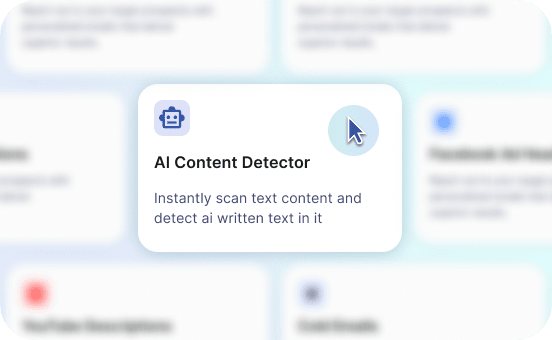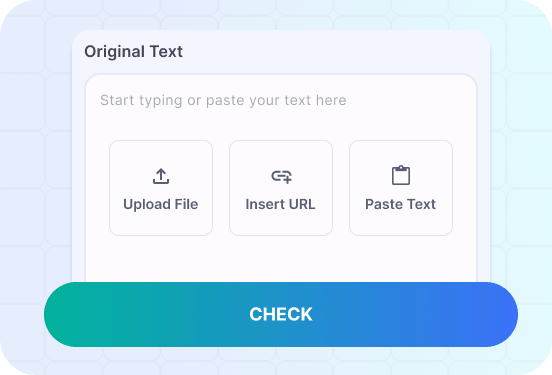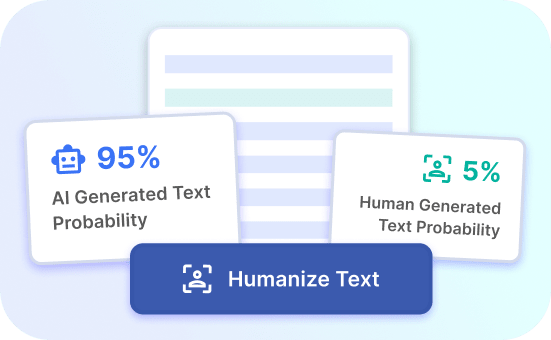ChatGPT and Plagiarism
Discover how ChatGPT can assist without risking plagiarism accusations. Get accurate and original content with ease.
Justdone.ai Benefits
Plagiarism-Free Writing
Create original, plagiarism-free content with ease using ChatGPT's advanced capabilities.
Effortless Content Creation
Save time and effort by effortlessly generating unique content without the risk of plagiarism accusations.
Accurate and Original Content
Ensure your content is accurate and original, avoiding potential plagiarism issues with ChatGPT's assistance.
Benefits of Using ChatGPT for Avoiding Plagiarism
Accurate Paraphrasing
ChatGPT assists in creating accurate paraphrases of the original content, allowing users to express the same information in a different manner. By using synonyms and alternate sentence structures, it helps in avoiding plagiarism.
This feature is particularly valuable for writers and researchers who need to cite information from existing sources while ensuring that their work is original and not duplicated.
Try Justdone ->
Enhanced Content Originality
With ChatGPT, users can generate original content and ideas based on the provided input. This aids in crafting unique pieces of writing that are not plagiarized or duplicated from other sources.
By using the tool to generate original content, writers and content creators can maintain the integrity of their work and avoid potential plagiarism issues.
Try Justdone ->
Efficient Plagiarism Prevention
ChatGPT can be used as a preventive measure to identify and rectify unintentional plagiarism. By generating unique content and offering alternative phrasing suggestions, it helps in avoiding accidental duplication of existing text.
This proactive approach assists writers and creators in maintaining the authenticity of their work and upholding ethical writing standards.
Try Justdone ->
Practical Tips for Avoiding Plagiarism Using ChatGPT
Understand Source Material
Before using ChatGPT to generate content, thoroughly understand the source material or key concepts. This ensures that the generated content is an original expansion or interpretation of the existing information, avoiding unintentional plagiarism.
By comprehending the source material, writers can effectively utilize ChatGPT to enhance their content without the risk of inadvertently replicating existing text.
Verify Generated Content
After creating content using ChatGPT, verify the output for originality and uniqueness. Utilize plagiarism checkers or comparison tools to ensure that the generated content does not closely resemble existing sources.
By reviewing the output, writers can confidently assess the originality of the generated content and make necessary adjustments to avoid potential plagiarism issues.
Cite Sources Appropriately
When integrating information from external sources, ensure proper citation and attribution. ChatGPT can be used to rephrase or present sourced content uniquely, but it's crucial to cite the original sources to acknowledge the intellectual ownership.
By appropriately citing sources, writers demonstrate ethical writing practices and distinguish their original contributions from existing information.
Utilize Diverse Input
Provide diverse input to ChatGPT to generate original content. Incorporate multiple perspectives, data points, or unique insights to prompt the tool to produce distinct and innovative content that is less likely to resemble existing sources.
By diversifying the input, writers can leverage ChatGPT to create fresh and original content, reducing the risk of unintentional similarities to pre-existing information.
Seek Peer Feedback
Before finalizing content generated through ChatGPT, seek feedback from peers or colleagues. By obtaining external perspectives, writers can identify any unintended similarities to existing material and make necessary revisions to ensure content originality.
Peer feedback serves as a valuable checkpoint to validate the originality of the content and address any potential concerns related to unintentional plagiarism.
How to use AI Content Detector
- 1
Choose a template
Select the necessary template from the template gallery.

- 2
Provide more details
Fill out the carefully selected inputs to create the best quality of output content.

- 3
Enjoy the results
Copy, save for later, rate the output or hit regenerate button.

Sample Use Case: ChatGPT for Plagiarism Avoidance
Explore a practical example of using ChatGPT to craft original content and prevent plagiarism in academic writing.
Craft an original academic paper introduction on the topic of 'Artificial Intelligence' while ensuring distinctiveness from existing literature.
Introduction to Artificial Intelligence
Artificial intelligence (AI) has emerged as a transformative technology, revolutionizing various industries and reshaping the way tasks are executed. The advancements in AI have led to unprecedented developments, ranging from autonomous vehicles to advanced medical diagnostics.
The rapid progression of AI technologies has sparked widespread interest and debate, raising crucial questions about ethical implications, privacy concerns, and the future of human-machine collaboration. While AI continues to unlock new possibilities, it also presents complex challenges that necessitate a comprehensive understanding and ethical deployment.
The introduction of AI signifies a paradigm shift in how we perceive and interact with technology, offering unparalleled opportunities for innovation and addressing societal needs. As AI continues to evolve, its integration into diverse domains underscores the need for responsible and ethical utilization to harness its full potential while mitigating potential risks.
In summary, the multifaceted impact of AI underscores the significance of exploring its implications, limitations, and ethical considerations. This paper aims to delve into the multifaceted landscape of AI, offering fresh insights and perspectives to contribute to the ongoing discourse surrounding artificial intelligence.
By crafting an original introduction to the topic of Artificial Intelligence, this example demonstrates how ChatGPT can be utilized to develop unique academic content while ensuring differentiation from existing literature, thereby mitigating potential plagiarism concerns.
Generate a unique research paper abstract on the theme of 'Climate Change' while maintaining originality and avoiding similarities with existing scholarly works.
Abstract: Exploring Climate Change Dynamics
Climate change stands as a defining challenge of our era, exerting profound effects on ecological systems, global weather patterns, and human livelihoods. The intricate interplay of environmental factors and human activities has accelerated the pace of climate change, necessitating urgent action and innovative solutions to mitigate its far-reaching impacts.
This research endeavors to dissect the complex dynamics of climate change, probing into the interconnected factors driving environmental transformations. By scrutinizing the intricate web of climatic variables, anthropogenic influences, and ecological feedback loops, the study seeks to unravel the underlying mechanisms shaping contemporary climate change trends.
The convergence of scientific research, policy initiatives, and community engagement forms the cornerstone of addressing climate change challenges. Through interdisciplinary collaboration and knowledge exchange, this research strives to present novel perspectives and actionable insights to combat the escalating threats posed by climate change.
In essence, this abstract encapsulates the pivotal role of interdisciplinary research in elucidating climate change dynamics and devising sustainable strategies to mitigate its repercussions. By leveraging ChatGPT to craft an original research abstract, this example underscores the tool's efficacy in generating distinctive scholarly content while upholding academic integrity.
This example illuminates how ChatGPT can be leveraged to produce original research content, showcasing its utility in crafting scholarly works with a unique perspective and avoiding similarities with existing literature, thereby safeguarding against potential plagiarism concerns.